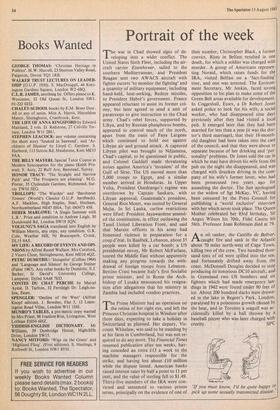Portrait of the week
The war in Chad showed signs of de- veloping into a wider conflict. The United States Sixth Fleet, including the air- craft carrier Eisenhower, sailed to the southern Mediterranean, and President Reagan sent two AWACS aircraft with fighter escorts 'to monitor the fighting' and a quantity of military equipment, including hand-held, heat-seeking, Redeye missiles, to President Habit's government. France appeared reluctant to assist its former col- ony, but later agreed to send a unit of paratroops to give instruction to the Chad army. Chad's rebel forces, supported by Libya, and by Russian phosphorus bombs, appeared to control much of the north, apart from the oasis of Faya Largeau which continued to hold out against Libyan air and ground attack. A captured Libyan pilot was brought to Ndjamena, Chad's capital, to be questioned in public, and Colonel Gaddafi made threatening noises against America's 'invasion' of the Gulf of Sirte. The US moved more than 5,000 troops to Egypt, and a similar number arrived in Honduras. In Upper Volta, President Ouedraogo's regime was overthrown by Captain Sankara, with Libyan approval; Guatemala's president, General Rios Montt, was ousted by General Mejia. In Sri Lanka, curfew restrictions were lifted: President Jayawardene amend- ed the constitution, in effect outlawing the Tamil United Liberation Front, and said that Marxist officers in his army had fomented violence in preparation for a coup d'etat. In Baalbek, Lebanon, about 35 people were killed by a car bomb; a US presidential envoy, Mr Robert McFarlane, toured the Middle East without apparently making any progress towards the with- drawal of foreign troops from Lebanon. Bettino Craxi became Italy's first Socialist prime minister, and in Rome the Arch- bishop of Lusaka announced his resigna- tion after allegations that his ministry in Zambia had included voodoo practices.
The Prime Minister had an operation on the retina of her right eye, and left the Princess Christian hospital in Windsor after three days, expecting to take a holiday in Switzerland as planned. Her deputy, Vis- count Whitelaw, was said to be standing by at his farm in Cumberland, but was not re- quired to do any more. The Financial Times resumed publication after ten weeks, hav- ing conceded an extra £13 a week to the machine managers responsible for the strike, and having lost about £10 million while the dispute lasted. American banks raised interest rates by half a point to 11 per cent, and the value of sterling fell to $1.49. Thirty-five members of the IRA were con- victed and sentenced to various prison terms, principally on the evidence of one of their number, Christopher Black, a former convict. Riots in Belfast resulted in one death, for which a soldier was charged with murder. A group of Americans represen- ting Noraid, which raises funds for the IRA, visited Belfast on a 'fact-finding' tour, and one was arrested. The Environ- ment Secretary, Mr Jenkin, faced strong opposition to his plan to make some of the Green Belt areas available for development. In Coggeshall, Essex, a Dr Robert Jones asked police to look for his wife, a social worker, who had disappeared nine days previously after they had visited a local pub. It emerged later that they had been married for less than a year (it was the doc- tor's third marriage), that their 18-month- old daughter had been taken into the care of the council, and that they were about to separate because of her drinking and 'per- sonality' problems. Dr Jones sold the car in which he may have driven his wife from the pub on the night she disappeared, and was charged with drunken driving in the com- pany of his wife's former lover, who had been prosecuted two years ago for assaulting the doctor. The Sun apologised to the widow of Sgt McKay, VC, having been censured by the Press Council for publishing a 'world exclusive' interview with her which never took place. The Queen Mother celebrated her 83rd birthday, Sir Angus Wilson his 70th, Fidel Castro his 56th. Professor Joan Robinson died at 79.
A n oil tanker, the Castillo de Beilver, .La,.caught fire and sank in the Atlantic about 70 miles north-west of Cape Town, killing two of the crew. Two hundred thou- sand tons of oil were spilled into the sea, and fortunately drifted away from the coast. McDonnell Douglas decided to stop producing its notorious DC10 aircraft, and in Greenland two US bombers and six fighters which had made emergency lan- dings in 1942 were found under 80 feet of ice. About 200 hundred ducks were drown- ed in the lake in Regent's Park, London, paralysed by a poisonous growth cdused by the heat, and in Toronto a seagull was ac- cidentally killed by a ball thrown by a baseball player who was later charged with
'If you must know, I'd be quite happy to pick up some sexually transmitted disease.






































 Previous page
Previous page